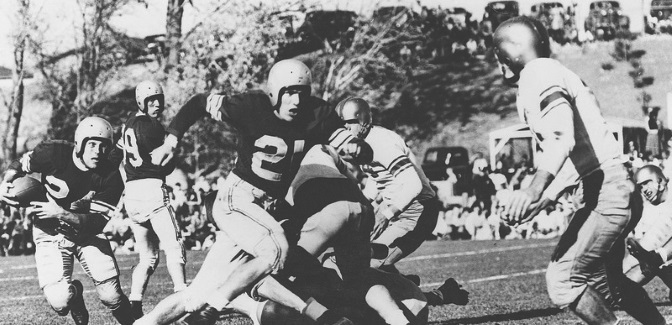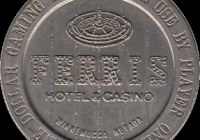|
Listen to this Gambling History blog post here
Getting your Trinity Audio player ready...
|

1948
The November 22, 1948 issue of Sports-Week roiled Nevada Wolf Pack fans and supporters.
Array of Allegations
An article in that edition of the nationally circulated digest charged that the University of Nevada* (UN) football team had thrown the game against Santa Clara two weeks earlier, on November 7, “for the specific benefit of Nevada gamblers” — casino owners and operators and bookmakers — who’d made “a killing” on it (Reno Evening Gazette, Nov. 30, 1948).
The Nevada Wolf Pack had been favored in that game; the Santa Clara Broncos had been a 21-point underdog. The loss cost the Pack a bowl bid.
The story asserted that Renoites were saddened by the Wolf Pack’s 14-0 loss to the Broncos, except for an “exclusive group of bookies who were on the ‘in’ and a few dozen assorted Nevada football players who were on their payroll” (The Camden News, Nov. 20, 1948).
Those players, the article explained, which included All-America candidate, quarterback Stan Heath, received weekly paychecks from the area gambling clubs, a charge the casinos subsequently denied. (Some players worked in the gambling clubs only during summers, they said.)
The exposé noted that Nevada casinos donated large sums to UN in what appeared publicly to be a gracious act but in reality was to buy off the necessary officials so the football team would win or lose as instructed. Reno casino owners gave $30,000 (about $304,000 today) as “a direct subsidy to the university and planted their $40,000,000 per annum business [$406 million today] squarely behind the ostensibly noble purpose of building a national gridiron power,” wrote Don Freeberg, staff writer for the New York-based publication.
Up in Arms
The response in The Silver State to the Sports-Week piece was swift and adamant. Several Nevada attorney-politicians even volunteered to intervene: Patrick “Pat” A. McCarran, then U.S. senator for Nevada; E.P. Carville, former U.S. senator and governor; and Morley Griswold, former governor.
As a policy, most of the large casinos in Northern Nevada didn’t accept bets on Nevada football games, they clarified through the media. Those that did noted that $500 ($5,000 today) at most had been wagered on the Pack-Broncos game locally.
UN’s newspaper, The Sagebrush, published an editorial demanding action against Sports-Week.
“If the athletic board sits back and allows this incident to pass unnoticed, many will reason it is true,” it read. “It is time to stop ignoring accusations and time to start making a few people eat their insidious remarks. In the event such action does not come, it is time for the board of regents to take over and protect its interests.”
School athletics officials — Joe Sheeketski, director of athletics and head football coach, and Harry Frost, chairman of UN’s board of athletic control — publicly denied the allegations. They had the law firm, Thatcher, Woodburn and Forman, demand that Sports-Week publisher Marty Berg print a full retraction of the story or face a libel suit. In their letter, the attorneys wrote:
“The University of Nevada athletic department makes a categorical and complete denial of the charges and insinuations contained in the article. The charges in your article are infamous, untrue and damaging to Nevada athletics, to the members of the athletic department and to the boys on the Nevada squad.”
Editor Backpedals, Sort Of
Berg issued a public statement in which he didn’t admit any wrongdoing or regret. Sports-Week hadn’t run the article with malicious intent or carelessness, he said. Rather, it published it “in the interest of clean sports in this country which is especially needed so far as college football is concerned.”
He shifted blame to UN officials, saying they’d read into the article charges that weren’t there, perhaps his way of backing off the accusations.
Yet, he seemed to re-level the allegations in his concluding remark: “We commend the Nevada situation to the governor of that state. We believe it warrants his inspection, if Nevada is to occupy any wholesome position in college athletics in this country.”
Berg agreed to print the Reno attorneys’ letter in full in the upcoming December 6 issue. Presumably, he did, as the university didn’t sue Sports-Week. Instead, it let the issue die a quick death.
* The university was located in Reno. Today, the university is called the University of Nevada, Reno to be distinguished from its southern counterpart, the University of Nevada, Las Vegas, which didn’t exist then.
What do you think? Did the Wolf Pack throw the game for the casinos?
Do any of you have either of these Sports-Week issues, November 7 or December 6, 1948? It’d be great to see the article and subsequent letter in full.
Sources
Photo from University of Nevada, Reno’s Wolf Pack Athletics Digital Collection





